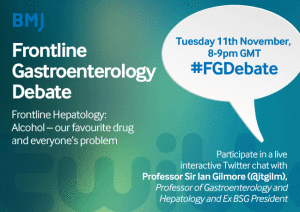After the great success of the IBD #FGDebate with Dr Charlie Lees, we are delighted to announce our third debate will be lead by Prof Sir Ian Gilmore (@itgilm), on 11th November 2014, at 8-9pm GMT and discuss, “Frontline Hepatology: Alcohol – our favourite drug and everyone’s problem”
Professor Sir Ian Gilmore is an honorary consultant physician at the Royal Liverpool University Hospital and holds an honorary chair at the University of Liverpool. After training in Cambridge, London and the USA, he moved to Liverpool as a consultant in 1980, where he has enjoyed working ever since. His specialty interest is liver disease. He is the immediate past-president of the Royal College of Physicians (RCP) and the British Society of Gastroenterology. He is chairman of Liverpool Health Partners, an organisation created between the University and the teaching hospitals in Liverpool to promote an Academic Health Science Centre in order to foster academic innovation, education and service development in the region. He has particular interest in health harms related to alcohol misuse and the role of regulation in reducing this. He chaired a RCP Working Party in 2001, producing the report “Alcohol – can the NHS afford it? A blueprint for a coherent alcohol strategy”. He chairs the UK Alcohol Health Alliance in which relevant agencies work together in a coherent and focused framework. He has also been appointed as Chair of the European Alcohol and Health Forum Science Group and is a member of the Climate and Health Council. He recently became President of the charity Alcohol Concern. He was knighted in the Queen’s Birthday Honours List of 2010 and is a Deputy Lieutenant of Merseyside.

In advance of that #FGDebate, Professor Gilmore says:
‘We are in the middle of an epidemic of alcohol-related diseases, of which alcoholic liver disease is a prime and crucial example. The burden of alcoholic liver disease and its complications is so great that all gastroenterologists, whatever their special interest, need to be competent to manage them. Furthermore, gastroenterologists and hepatologists seem to see, almost by default, the majority of patients in the UK admitted to hospital with alcohol-related conditions whether or not the GI tract or liver is affected, and so are the natural leaders not just in the clinical management but also in becoming advocates for evidence-based policies to reduce the burden. Public health may not be familiar territory for them, but it is an area where they can make as big a difference as on the wards. Also, by becoming champions for alcohol care teams in their hospital, they can not only make sure patients with alcohol dependence get a better outcome but also free up beds and save valuable resources. Finally, it is important that gastroenterologists have some knowledge of treatment options for alcohol dependence and the range of medications that they can prescribe. It is important to dispel the myth that treatment for alcohol dependence does not work – on the contrary it is highly cost-effective.’
Join us on Tuesday 11th November to tackle these important issues and bring other questions and ideas to the discussion.’
We look forward to you joining us then for the third #FGDebate
